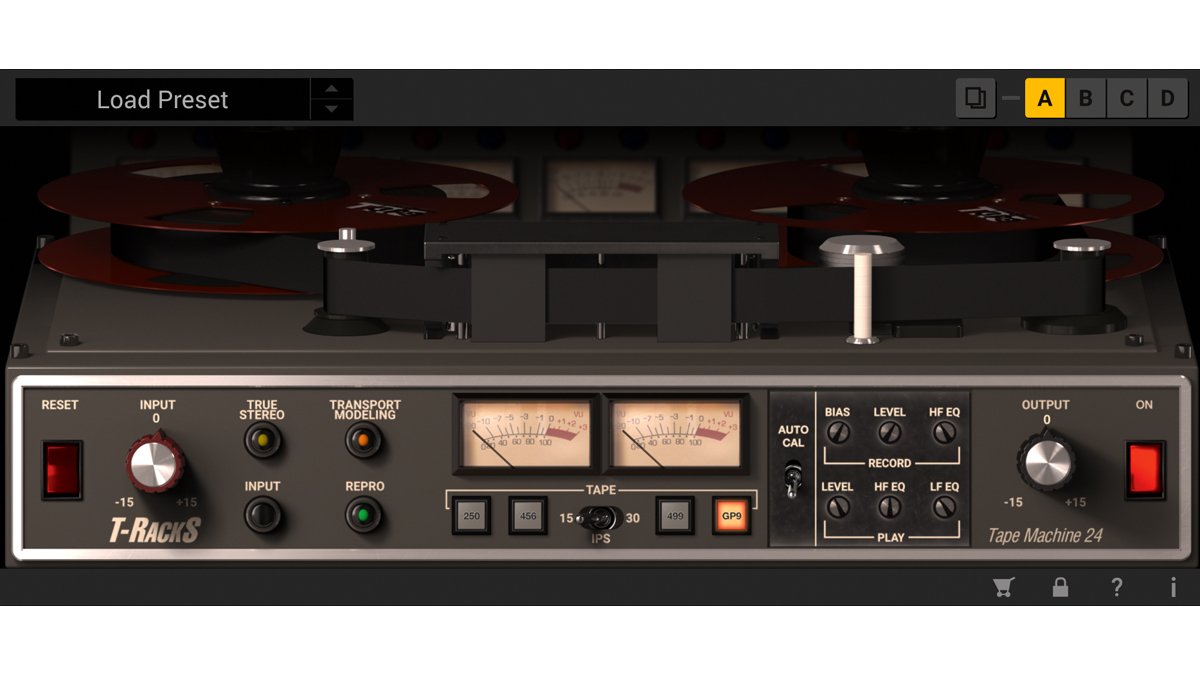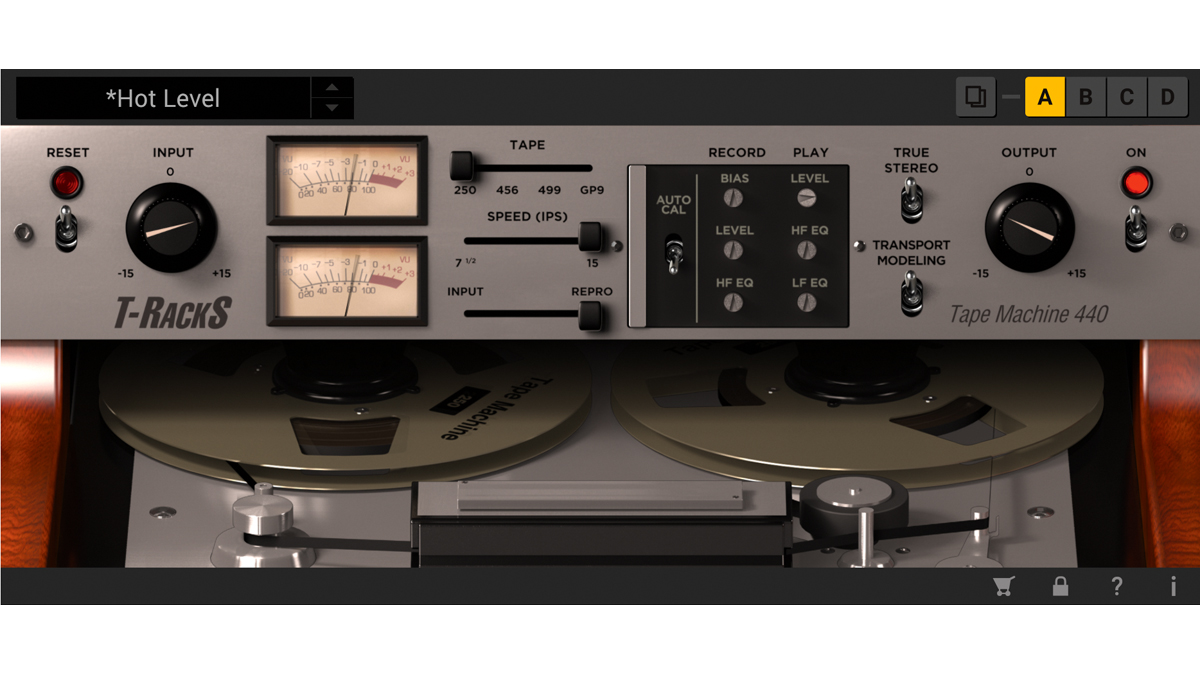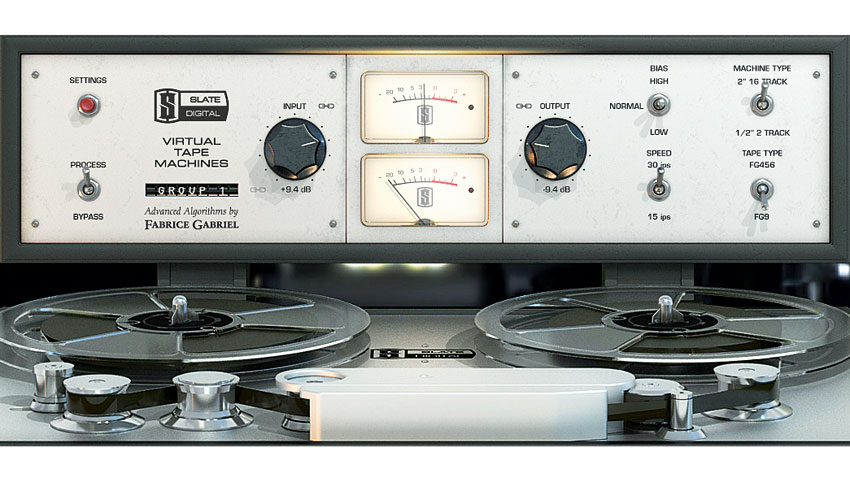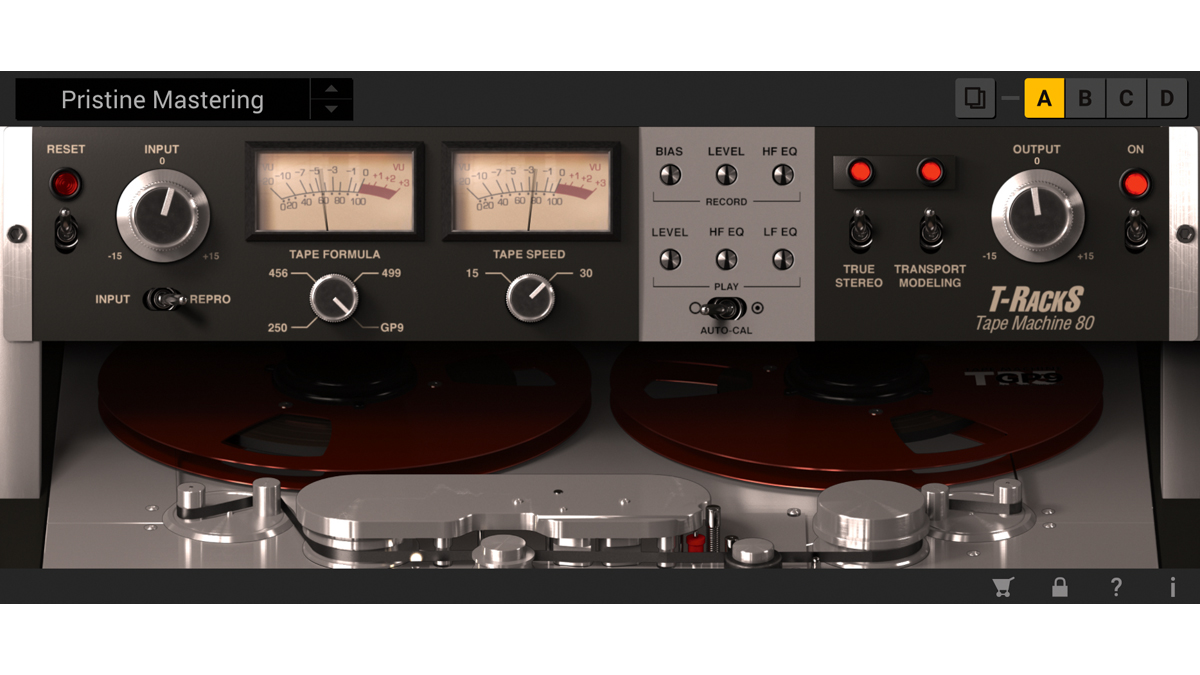MusicRadar Verdict
With four very different machines, editable parameters and a choice of tape types, TMC includes enough tape flavours for a broad range of tasks.
Pros
- +
Four quite different tape machines
- +
Adjustable bias, recording level and EQ
- +
Stereo tape emulation mode
Cons
- -
No cross-plugin grouping or linking
- -
Tape noise not emulated
MusicRadar's got your back
What is it?
IK Multimedia has been busy building emulations of some classic European and American analogue tape machines, and the result is four processors, available individually or as part of the money-saving T-RackS bundle. They come both as individual plugins (AU/VST/AAX/ standalone) as well as modules for use in the T-RackS 5 plugin and the standalone version of T-RackS 5.
The source machines are the MCI JH24 2" 24-track, Studer A80 1/4" stereo, Revox PR99 MkII 1/4" stereo and Ampex 440B 1/4" stereo, and the corresponding plugins are name Tape Machine 24, 80, 99 and 440.
Visually, each plugin is uniquely styled and clearly inspired by the original hardware. The general feature set is largely standardised across all of them and includes the choice of Tape Formula, Tape Speed, calibration settings such as record Bias and record Level, and overall Input and Output level (+/-15dB). You can also plump for Repro mode, which includes all of the tape processing mentioned above, or choose Input mode, which only activates the input and output stages of the selected machine.
There are four tape types - 250, 456, 499 and GP9 - based on the Scotch, Ampex and Quantegy formulations, covering a decent spread of the popular tapes used over the last 40 years. Tape speeds are specific to the emulated hardware, with 15 and 30IPS for Tape Machine 24 and 80, and 7.5 and 15IPS for Tape Machine 99 and 440.
The plugins don’t get into the nitty gritty of operating levels, EQ types and so on, which is a good thing. Essentially, when you load a tape type and select a speed, simply use the AutoCal option to zero the calibration controls mentioned above. You can then use the calibration tweakers to move away from those optimum settings if you want. All plugins also include stereo channel and transport modelling features. Finally, the Reset button returns the plugin to its default settings, which in all cases is its faster tape speed coupled with 456 tape formulation.


Performance and verdict
Testing tape machine emulations can be a pretty subjective process, as the best machines only create quite subtle changes that build up over multiple tracks. Even so, these T-RackS models do cover quite a range of machine types and tape speeds, and perhaps unsurprisingly, it’s the slower 1/4" models that sound the most coloured.
This is particularly true of Machine 440, which, at 7.5IPS, sounds quite dark, although the overall sound is certainly quite smooth. Similarly, Machine 99 is coloured at 7.5IPS, but less so than the 440, and overall, Machine 99 is pleasingly hi-fi sounding.
In terms of overall fidelity, we think Machine 24 wins hands-down, working well across multiple tracks for adding subtle sheen and harmonic richness. Our professional analogue tape expectations were best met by Machine 80, though. This delivers a wonderfully bright, enhanced sound at its higher speed. Although based on a 1/4" format, it worked really well for us across a multitracked drum kit, adding both punch and high frequency lift.
Across all machines, we found that the tape formulation had less impact than we expected. Even so, there are some differences in saturation from one to the next, and the newer higher output tapes don’t always seem to saturate less, which is intriguing.

To gain a bit more insight, we did some bench tests and discovered that all four models exhibit 3rd and 5th harmonic distortions in Repro mode, but, as you would expect, no noticeable distortions in Input mode. The harmonics generated are greater with the 250 and 456 tape types, and also at the slower tape speeds. Also, the balance between odd and even harmonics shifts as the record level changes. Nevertheless, for the most part, the end-to-end frequency responses in Repro mode seem to match our observations above.
One thing the machines don’t do is model tape noise, and this is clearly a design choice. There’s also no way to group and link multiple instances of the plugin, which really helps when emulating multitrack tape, such as a multi-miked drum kit, for example, across many DAW tracks.
For us, a couple of further useful inclusions would be reverse linking for input and output levels, and manual resizing of the windows. Also, we did notice the CPU usage stacking up when we tried the plugin across multiple tracks.
Still, the T-RackS Tape Machine Collection delivers an interesting selection of tape machines, typical tape formulations and plenty of opportunity to modify and fine tune individual settings. It’s great for everything from master bus duties to more specific and creative processing, and, although pricey, offers much better value than buying each one individually.
MusicRadar verdict: With four very different machines, editable parameters and a choice of tape types, TMC includes enough tape flavours for a broad range of tasks.
The web says
"It would not surprise me in the slightest if IKM Tape Machines was the most realistic emulation available today. It certainly seems to make your CPU work harder than any of the competition to achieve the goal of realism. " Sound Bytes
"This is an excellent bundle of modelled tape machines, easy to use and with a really pleasing sound that can take you anywhere from subtle warming through to full-on classic tape wobble." Ask.Audio
Hands-on demos
Unders
ZoZillaThaGreat
RealHomeRecording.com
Specifications
- Works within the T-RackS CS Standalone application and as plug-in
- High-quality oversampling
- High-precision and high-transparency digital processors
- Accurately analog-modeled vintage classic devices
- Full-latency compensation support
- Supports sampling rates up to 192 kHz
- DSM™ and SCC™ proprietary IK technologies for extremely accurate digital models of analog hardware devices
- Native compatibility with 64-bit applications and operating systems
Computer Music magazine is the world’s best selling publication dedicated solely to making great music with your Mac or PC computer. Each issue it brings its lucky readers the best in cutting-edge tutorials, need-to-know, expert software reviews and even all the tools you actually need to make great music today, courtesy of our legendary CM Plugin Suite.
“A synthesizer that is both easy to use and fun to play whilst maintaining a decent degree of programming depth and flexibility”: PWM Mantis review
“I feel like that song had everything we needed to come back with”: Bring Me The Horizon’s Lee Malia on Shadow Moses, its riff and the secrets behind its tone, and why it was the right anthem at the right time
“I said, ‘Are we sure we can write a song about death?’”: The story of Mike + The Mechanics' classic No.1 The Living Years











